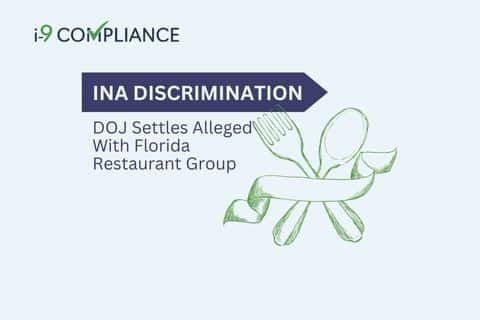DOJ Settles Alleged INA Discrimination With Florida Restaurant Group

The Department of Justice (DOJ) recently settled a lawsuit with a Florida-based restaurant group. This settlement addressed allegations that the organization routinely discriminated against lawful permanent residents when completing the employment eligibility verification (Form I-9) process. As a result, it ended litigation with the group and compensated those affected by the alleged actions.
According to the DOJ, the Bradenton, Florida Restaurant Group routinely required lawful permanent resident workers to present permanent resident cards to complete the Form I-9 process. The company continued this practice regardless of whether the employee presented suitable proof of employment eligibility. Assistant Attorney General Kristen Clarke of the DOJ’s Civil Rights Division said the following about the investigation and settlement:
“It is unlawful for employers to reject valid documents from lawful permanent residents and require them to present a specific document because of their citizenship status when checking their permission to work. Unnecessary and discriminatory obstacles in the onboarding process can harm those who wish to lawfully participate in our economy and deprive employers of their talents.”
The Employee and Immigrant Rights Section (IER), a part of the DOJ’s Civil Rights Division, began its investigation after a complaint from a worker. The employer had required her to provide a permanent resident card and the documentation she had already provided. According to the complaint, this requirement came even after she provided sufficient documentation to prove her employment eligibility.
As a result, the IER determined that these actions were part of a larger practice requiring documentation from lawful permanent residents to complete Form I-9. The IER concluded that this occurred from at least March 1, 2023, to September 1, 2023.
Individuals may complete the Form I-9 process by providing any suitable mix of documentation. This practice of the individual choosing what to provide applies to lawful permanent residents, too. As such, these residents could furnish many of the same documents that U.S. citizens use.
The Immigration and Nationality Act (INA) requires employers to accept any documentation a worker provides that proves genuine and related to the holder. Denying these documents violates the INA’s anti-discrimination provisions. As such, employers cannot request additional or specific documentation outside of what Form I-9 lists. Under the settlement agreement, the employer will pay a civil penalty of $12,700, provide its workers with additional training, and revise any policies as necessary.
The DOJ reminds employers how crucial it is to comply with the INA and other employment laws. One way to ensure compliance is by using an electronic I-9 management tool. This tool offers step-by-step guidance through the verification process, digital storage, notifications of when to take action, and an optional E-Verify integration.
Learn more about automating your employment eligibility verification and ensuring compliance with I-9Compliance.